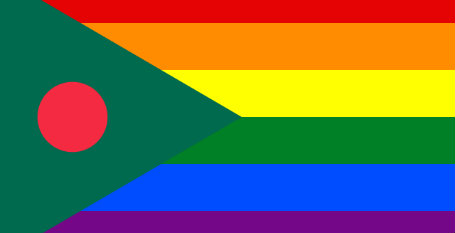“It goes against our values. Like many other countries including those Muslims and Christian, we opposed it,” Bangladesh Permanent Representative to the UN Abdul Momen told the Dhaka Tribune.
Bangladesh, a Muslim majority country, has also said it would not support the ICPD recommendations for comprehensive sexuality education programs for 12-13 year-old children with regards to LGBT sexuality.
Indian and China, the world’s most populous countries, as well as the two major powers in Asia are also likely to veto the ICPD’s recommendations when it is scheduled to be put to vote Sept 22 at the 69th UN General Assembly.
Bangladesh’s position is in keeping with past events when at the sixth Asian and Pacific Population Conference held in Bangkok last year, it expressed its reservations on recommendations on sexual orientation and gender identity, according to dhakatribune.com
The ICPD recommendations aims to “work to reduce vulnerability and eliminate discrimination based on sex, gender, age, race, caste, class, migrant status, disability, HIV status, sexual orientation and gender identity, or other status (since it expresses) grave concern at acts of violence and discrimination committed against individuals on the grounds of their sexual orientation and gender identity.”
Momen said it took exception to the ICPD texts on gender discrimination. “If you look at the texts, they talked about ‘eliminate discrimination’ or ‘acts of violence,’ which sound very good but if read carefully, one can find that it actually preaches rights of the LGBT,” he reportedly said.
“It goes against our values and laws, and we cannot endorse it” he added.
“It is unacceptable” that ICPD proposes to provide rights to a person who has sexual relations with a person of the same sex, he said. “Even in the US, out of 50 states, only 16 allow rights of the LGBT,” he pointed out.
He said Bangladesh also objected to the ICPD proposal to provide children aged 12-13 years comprehensive sexuality education programs. “If we allow comprehensive sexuality education programs, then we have to teach our school-going children, with video presentation, how to have sex,” he said.
According to the Bangladesh Permanent Representative to the UN, only a few countries and a section of the UN Secretariat support the idea.
In Bangladesh where 90 percent of the 155 million people are Muslims, any discussion around sex and sexuality is taboo. Same-sex relations is considered “unnatural,” illegal and punishable by law in Bangladesh under Section 377 of the country’s Penal Code left behind by the British colonial authorities.
“It goes against our values. Like many other countries including those Muslims and Christian, we opposed it,” Bangladesh Permanent Representative to the UN Abdul Momen told the Dhaka Tribune.
Bangladesh, a Muslim majority country, has also said it would not support the ICPD recommendations for comprehensive sexuality education programs for 12-13 year-old children with regards to LGBT sexuality.
Indian and China, the world’s most populous countries, as well as the two major powers in Asia are also likely to veto the ICPD’s recommendations when it is scheduled to be put to vote Sept 22 at the 69th UN General Assembly.
Bangladesh’s position is in keeping with past events when at the sixth Asian and Pacific Population Conference held in Bangkok last year, it expressed its reservations on recommendations on sexual orientation and gender identity, according to dhakatribune.com
The ICPD recommendations aims to “work to reduce vulnerability and eliminate discrimination based on sex, gender, age, race, caste, class, migrant status, disability, HIV status, sexual orientation and gender identity, or other status (since it expresses) grave concern at acts of violence and discrimination committed against individuals on the grounds of their sexual orientation and gender identity.”
Momen said it took exception to the ICPD texts on gender discrimination. “If you look at the texts, they talked about ‘eliminate discrimination’ or ‘acts of violence,’ which sound very good but if read carefully, one can find that it actually preaches rights of the LGBT,” he reportedly said.
“It goes against our values and laws, and we cannot endorse it” he added.
“It is unacceptable” that ICPD proposes to provide rights to a person who has sexual relations with a person of the same sex, he said. “Even in the US, out of 50 states, only 16 allow rights of the LGBT,” he pointed out.
He said Bangladesh also objected to the ICPD proposal to provide children aged 12-13 years comprehensive sexuality education programs. “If we allow comprehensive sexuality education programs, then we have to teach our school-going children, with video presentation, how to have sex,” he said.
According to the Bangladesh Permanent Representative to the UN, only a few countries and a section of the UN Secretariat support the idea.
In Bangladesh where 90 percent of the 155 million people are Muslims, any discussion around sex and sexuality is taboo. Same-sex relations is considered “unnatural,” illegal and punishable by law in Bangladesh under Section 377 of the country’s Penal Code left behind by the British colonial authorities.












 Printable Version
Printable Version




















Reader's Comments
Be the first to leave a comment on this page!
Please log in to use this feature.